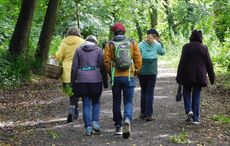Everyone in Ireland is a millionaire this special May day. It is glorious. Think of all the pastoral adjectives and they apply in spades. Gorgeous!
I'm sitting outside in the cottage garden drinking coffee. The warmed phone on the wall beside me rings.
It's brother Mickie, and he's coming up to Ennistymon on Monday night for a music session with Billy Keane (entertaining son of John B.) and a minibus load of cracked Kerrymen, and would I join them? Would I miss it? Not in a thousand years!
Somehow surreal for the times that are in it globally, but somehow apt, I notice for the very first time that one of the stones in the rude little wall around our garden pond is unusual. It is of some dark rock I cannot name, and it is the shape of the kind of skull I will reveal to the underworld when I am two years dead!
There is a narrow mouth slit looking up at me, moss where my beard is now, a significant nose and two deep eye sockets. You could see that as depressing, but not in the least because a black bull spider of the garden variety is currently chasing a smaller heifer spider across the face.
She is very beautiful but she is also a coquette. She has great legs, and she entices him by showing off three or four of them at a time.
He lunges into the bottom of the eye socket, blinded by lust, but by the time he gets there she has flashed across the bridge of the nose and is flaunting her other four legs from the sunlit bottom of the left side socket! Slut! The mating ritual then begins again.
I drain my coffee and finish off the other thing ye hate to hear me mentioning at all, and wish him the best of luck.
Behind them, in the tiny pond, hundreds of tadpoles fill the water with life, and there is one glowing lily. Birds are clearly in great form, and the air is heavy with the humming of bees. It is the season of the birds and the bees, is it not?
For the first time this season I notice there is heavy farm traffic in the Carhue road. I look more closely and see that the very first silage of the season is being brought home to Mick Quinn's silage pit up the road.
That now is a very significant happening. It is the first harvest of the growing season.
The green tractors with their huge high-sided Torro trailers are bringing home the aromatic freshly cut green grass from the meadows. It is the new enough face of Irish farming.
Haymaking is gone forever. Now it is either silage or big black plastic footballs of wilted grass that provide the winter feed.
Usually farm families now don't do the work themselves. There is a generation of highly skilled silage contractors who move in on contract and keep cutting day and night through the season.
It is the one time of the year when non-farmers see, if you like, the industrial face of modern farming. The huge tractors, two or three of them, ply between the cutting machine in the meadow and the silage pit with clockwork precision.
Huge fields which once took families and their neighbors maybe more than a week or 10 days to convert into cocks of hay are now shorn to the stubble in a matter of hours. Times have changed.
The inside of my left thumb begins to throb. It is back in the meadows of youth in the madness of those golden haymaking seasons of old.
Everybody pitched in to help. Those of you who were born here back then will never forget it.
If you were born on a farm you were better equipped to deal with the work than neighbors' children like us with soft hands and neither the forklore nor rakelore that came naturally to the farm children.
With either the rake or the fork, gathering in every last strand of hay, the first place we felt it was inside the left thumb. A great white fluid-filled blister developed there in a couple of hours, and when it burst there soon developed a red flesh hurting zone which you had to cover pronto, usually with a handkerchief because there never seemed to be plasters available. No plasters nor ointments and no sympathy.
The old ones, one eye on the weather, went into a frenzy to get the hay "saved" before the rains came. And the rains were never far away.
Ye of the soil will recall when the hay was just ready for cocking, and there would be a quick shower and then you would have to start all over again, turning the swathes manually with forks, shaking it out to dry, getting bitten on your arms and legs by "clegs" or horse flies, thirsty all the time.
And were those old ones so wrong in their way of working? The hay had to be whispering with dryness before they would cock it.
All or most of the nutrients were surely burned away by the time it eventually reached the wintering cows. I suppose they had no choice in those days before silage was even heard of, and that was the way it was always done.
When Bob Armstrong, our next door neighbor, introduced silage making to our parish back in the fifties everyone thought the decent man had gone stone mad.
Bob had an old quarry with high walls. He fired the mowings of one big meadow into it, soaked the hot grass with treacle (molasses) and then covered it with "scraws" of topsods and, to the neighbors' amazement drove his tractor back and forth across the whole pile to roll it flatter.
The subsequent smell across the parish was awful, sweetly sickly. People expected Bob to be transported to the mental hospital in Omagh any day now.
But come the feeding weeks of the winter when he was drawing home the brown silage from the quarry to his bred Ayrshires it was not long before the neighbors noted that their own cattle went stone mad for the bits of silage that fell on the road.
And Bob's herd of Ayrshires were thrivingly glossy when all the other cows were simply being "held" on the subsistence rations of hay all winter. In two seasons everyone was at it, and children like me were glad the days of the left thumb blister were over.
The tractors of modernity have been growling up and down past the cottage every five minutes precisely since I went inside to write this.
Strangely, I have a backside sensation too as well as the thumb one on this memory road. When the bottled tea and big sandwiches came to the meadows it was not all as idyllic as most remember it.
The food tasted special, yes, but it was also a reality that when you sat down to feast yourself you invariably sat atop a mossy nest of what we then called "pismires," and what the rest of the world called ants.
You only had short trousers without underpants, and the fiery little pismires knew exactly where to hurt you most and longest, and I need say no more than that. But you and I remember it well.
There is a fabulous TV advert running here now that emphasizes the change so very neatly. Two traditional farmers are working in the field, not making hay but building a stone wall.
The traditional housewife arrives from the house with the tea and sandwiches. It's the old picture, except that the sandwiches are prawn and avocado and the tea is green! One of the men takes a call on his cell phone and says no, he cannot meet his friend because tonight is his Pilates night. He mentions to his friend that herself seems in an awful hurry to get home and his friend, the husband, explains the reason is she's bidding for something special on eBay! It's very neat.
Before writing this last paragraph I went back out to the garden to check on the progress or otherwise of the bull spider and the coquette. They were sitting companionably together in the left socket of my skull -- which appeared to be grinning even more widely -- and they both looked very happy in the sun.
Never mind the recession. Life is good and strong.




Comments